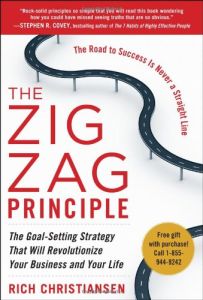Join getAbstract to access the summary!

Join getAbstract to access the summary!
Rich Christiansen
The Zigzag Principle
The Goal-Setting Strategy That will Revolutionize Your Business and Your Life
McGraw-Hill, 2011
What's inside?
Accomplish your goals in “zigzags.”
Recommendation
The way the crow flies – the shortest distance between two points – is a quick, straight line. Many people apply this routing principle to business and to life by chasing success on the apparently quickest, easiest route or the direct path of seemingly least resistance. Serial entrepreneur Rich Christiansen suggests that, instead, you progress toward your goals by “zigzagging.” His “Zigzag Principle” consists of three main steps: make a profit, add resources and scale your business. Christiansen provides solid advice that’s easy to follow. Most of his examples spring from his own successes and failures. He readily admits the latter but glories perhaps a bit too much in the former. Outside examples might have balanced the risk of self-promotion. Even so, Christiansen clearly proves the effectiveness of his zigzag strategy. getAbstract recommends his manual to entrepreneurs, small-business owners and managers of larger companies seeking direction.
Summary
About the Author
Rich Christiansen, a former executive at Mitsubishi Electric and About.com, is a serial entrepreneur. He has founded or co-founded more than 30 enterprises.





















Comment on this summary